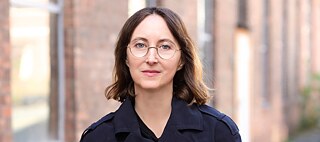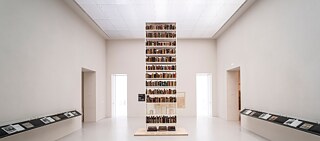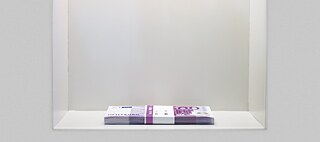Maria Eichhorn
Critically questioning the system of the arts

For decades, Maria Eichhorn has critically explored both social power relations and the art system itself in her work. Now she has an exhibition planned for the German Pavilion at the 2022 Biennale in Venice.
By Romy König
2021 started with some exciting news that caused a stir in the German art world: Maria Eichhorn, an artist known for questioning power relations and economic relationships in her work, had been tapped to design the German pavilion at the 2022 Biennale in Venice.
Taking a closer look though, it is a bit surprising that Eichhorn had never been included in the German Pavilion before. For many years now, she has explored German history in her work, such as the research projects Restitutionspolitik / Politics of Restitution (2003) at the Lenbachhaus in Munich and In den Zelten... (In the Tents, 2015) at the Haus der Kulturen der Welt in Berlin, for which she researched the dispossession of Jewish citizens during the Nazi era. For the documenta 14 in 2017, she founded the Rose Valland Institute dedicated to unresolved ownership and property relations from 1933 to the present. She has participated in the Biennale in Venice three times, and also exhibited pieces at the biennial art shows in Istanbul (1995 and 2005), Yokohama (2001), Berlin (2004 and 2008), Łódź (2004), Seville (2006), and Guangzhou (2008).

Analysing art’s operating system
Born in Bamberg, artist Maria Eichhorn studied at the Berlin University of the Arts from 1984 to 1990. She explores the processes of art creation in her pieces, negotiating the relationship between the work of art and the viewer, among other things. Her work is often site specific: she picks up local conditions and incorporates them into her artworks. In Berlin, she painted the walls of a gallery white and boarded up the windows with wood – the art world as a closed system – while in Stuttgart, she moved the local museum’s children’s workshop into the exhibition space.
When selecting her for the 2021 Kathe Kollwitz Prize, jurors praised how her work and research projects have “critically and continuously questioned the operating system for the arts at the interface of history, politics, and society,” for 30 years. Eichhorn, who teaches as a professor at the Zurich University of the Arts, was also honoured with the Paolo Bozzi Prize for Ontology by the University of Turin in 2018.

A memorial at the Biennale
And now the German Pavilion. She already has some initial ideas and has spoken out in favour of preserving the pavilion – historically speaking – as a “memorial”, a warning to future generations. Eichhorn has also revealed that she “does not view the pavilion in isolation” but “in company and interplay with other pavilions” with “country participation in relation to state-territorial and geopolitical, global economic and ecological developments”. She has also promised an “accessible” piece. The pavilion is to be “experienced both intellectually and on the ground physically and through movement.”